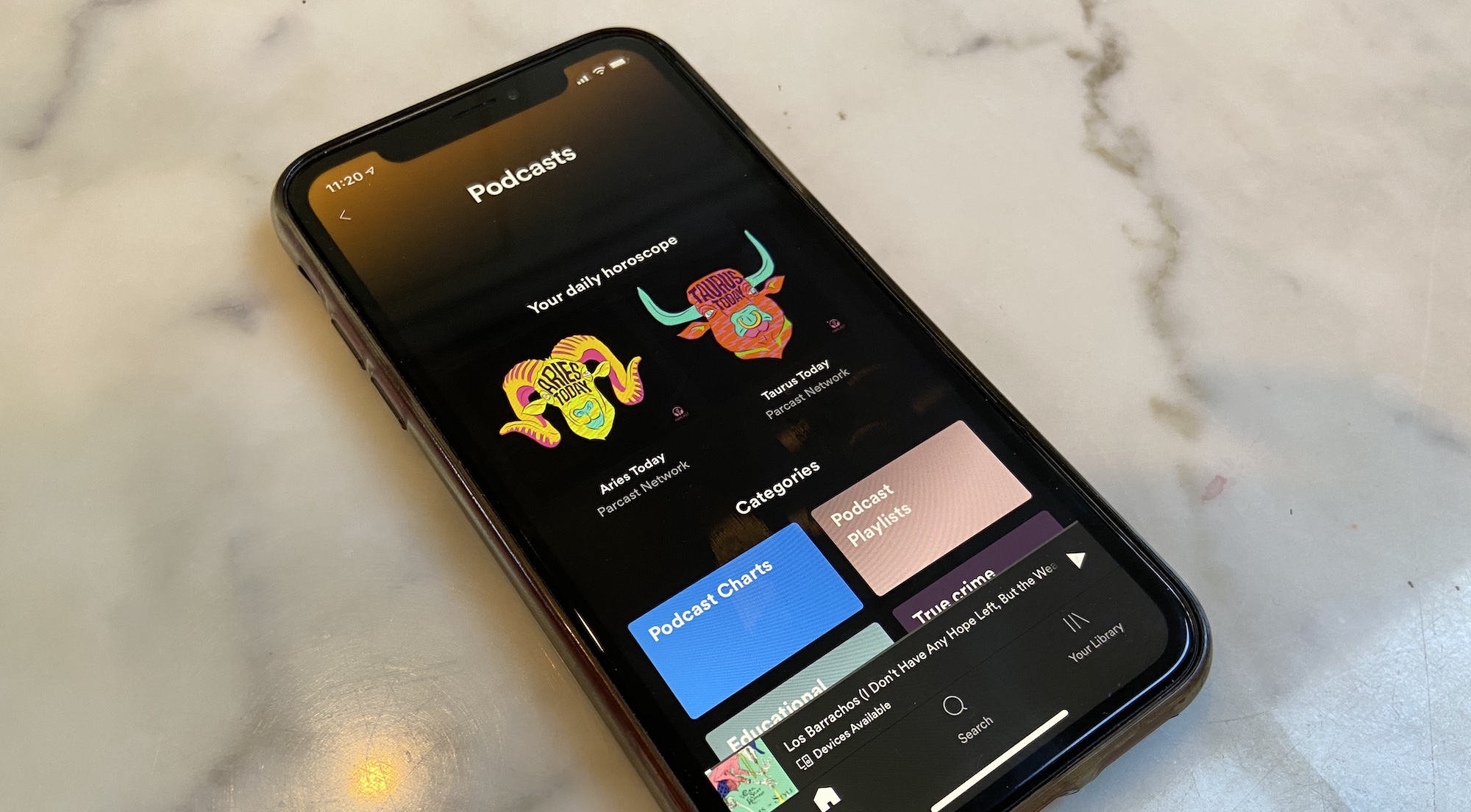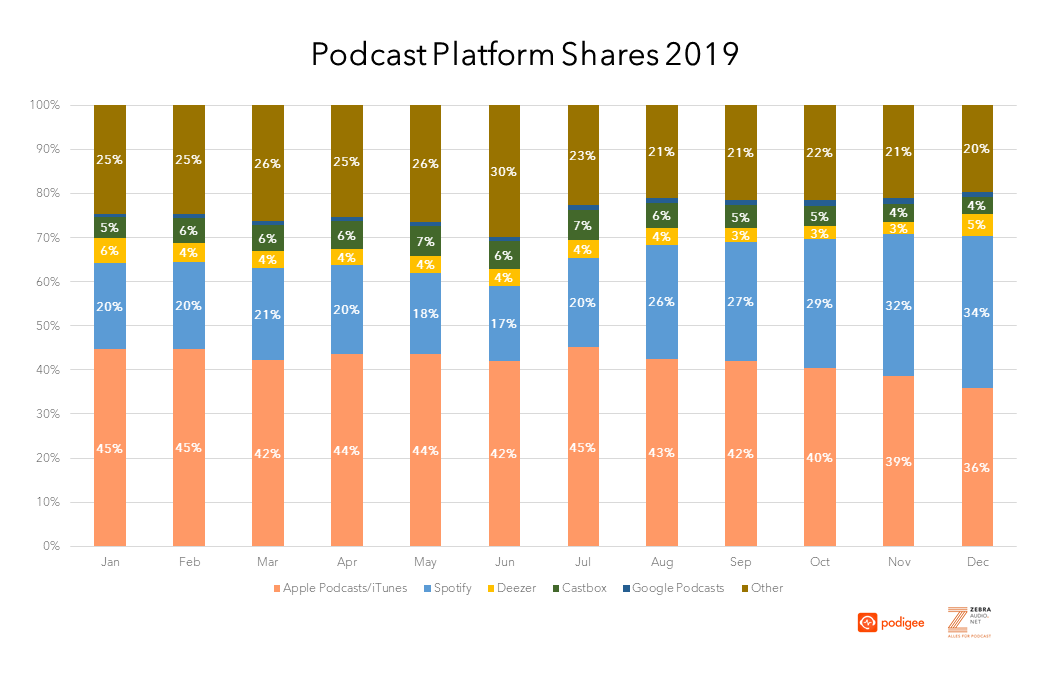
So, is it working? Some interesting new data from Germany seems to indicate yes — and gives us a reminder that platforms aren’t just neutral vessels for all kinds of content.
The data is from German podcast network zebra-audio.net and hosting and analytics provider Podigee, which looked at anonymized data on how and where Germans consumed more than 6,000 podcasts across 2019. (If you read German, you can find the full results here.)
Two points jumped out at me:

In January 2019, according to that hosting data, Apple Podcasts accounted for 45 percent of all podcast episodes streamed or downloaded in Germany. Spotify was well behind at 20 percent.
But by December? The score was a lot closer: Apple 36 percent, Spotify 34 percent. Nearly all of that movement came in the second half of 2019; from July to December, the percentage point gap between the two went from 25 to 27 to 15 to 11 to 7 to 2.
It should be noted that Germany is a core market for Europe-born Spotify in a way it’s not for Apple. Apple Music, for instance, has more subscribers in the U.S. than Spotify, but it’s well behind in the rest of the world. As of 2017, Spotify had nearly three times as many paying subscribers in Germany as Apple Music did. About three-quarters of German smartphones run Android, not iOS; it’s more like 50/50 in the U.S.
But still, that’s a lot of movement in a short period of time — movement that should be of some concern in Cupertino.
For years, podcasters have worried about “the discovery problem”: Podcasts are great, but they’re hard to discover. There are probably 20 shows out there right now that you would absolutely love — but you have no idea they even exist. Not everyone can get featured in Apple Podcasts; a huge amount of podcast discovery is just word of mouth.
This study has no data on it, but I’d wager Spotify is growing because it’s solving that discovery problem for some people. In other words, I doubt this movement is a bunch of dedicated Apple Podcasts listeners switching over to Spotify. It’s more likely that it’s about regular Spotify music listeners being presented with interesting podcasts right in the app they’re already using every day — just for a different purpose. Incumbency is fun.
Which leads to…
The zebra-audio.net/Podigee analysis identifies the top genres of podcasts consumed through Apple and Spotify. (And Deezer too, if that’s your jam.) There’s quite a bit of variety!
Apple:
1. News: 23.35%
2. Society & culture: 15.67%
3. Comedy: 13.39%
4. Business: 12.04%
5. Sports: 7.45%
Spotify:
1. Comedy: 23.51%
2. Sports: 15.55%
3. Business: 10.44%
4. Society & culture: 10.13%
5. News: 8.36%
Deezer:
1. Health & fitness: 17.93%
2. Society & culture: 15.14%
3. Music: 14.88%
4. Arts: 14.64%
5. Comedy: 14.21%
Quite a difference, right? News is No. 1 among Apple Podcasts listeners, with 23 percent of all downloads and streams. But on Spotify, it’s a straggler at No. 5, with only 8 percent. It’s not even Top 5 for Deezerists.
Meanwhile, Spotify users seem to like comedy (24 vs. 13 percent) and sports (16 vs. 7 percent) podcasts substantially more than Apple users do. Deezerists apparently only listen at the gym.
(Spotify’s strength in sports would seem to support its purchase of The Ringer. As Bill Simmons said at the time, Spotify’s goal here is to “build the world’s flagship sports audio network.”)
With a very few exceptions, all the same podcasts are available for listening on each of these platforms. So why would Apple users seem to like news podcasts so much more than Spotify users? Some theories:
But I think we can safely say that people launching Spotify are broadly looking for entertainment, and to a greater degree than Apple Podcasts users are. In that context, Spotify leading in comedy and sports and trailing in news makes perfect sense.
You can debate the causes — Apple users are generally richer and have more leisure time — but whatever the reason, Apple users overindex for news consumption around the world. Apple Podcasts is only available on Apple’s devices; Spotify’s available on iOS and Android. So it’s not shocking that Apple users consume more news podcasts.
News content is more likely to leave someone angry, depressed, helpless, or a range of other less-than-perfect emotions. More likely than comedy or sports talk, at least.
I just launched Spotify and went to its podcasts section. The top recommendation? A daily horoscope podcast.
Anyway, those are my theories — you may have your own. But either way, the Spotify/Apple news podcasts gap is an excellent reminder that all platforms favor some kinds of content over others — even ones as comparatively open as podcast apps.
You can consume news on both Twitter and Facebook. But fundamental elements of both platforms tend to favor news more on Twitter than on Facebook. (Twitter: the real-time nature of stream; the focus on linking out; one-way following; the headline-length brevity. Facebook: a highly algorithmic feed that takes you away from anything “live”; the weirdness of having many different kinds of people all in a single mass of “friends”; you don’t want to discuss politics with your uncle.)
You can consume news on both Instagram and TikTok. But Instagram is optimized for pretty pictures in the feed, so publishers share lots of beautiful photojournalism; TikTok is optimized for short-form video humor so The Washington Post tells jokes there.
You can consume news podcasts on both Apple Podcasts and Spotify. But the structures of both incentivize some kinds of content over others. And it’s possible that Spotify’s ongoing growth here might leave podcasters with a larger but more news-averse audience.